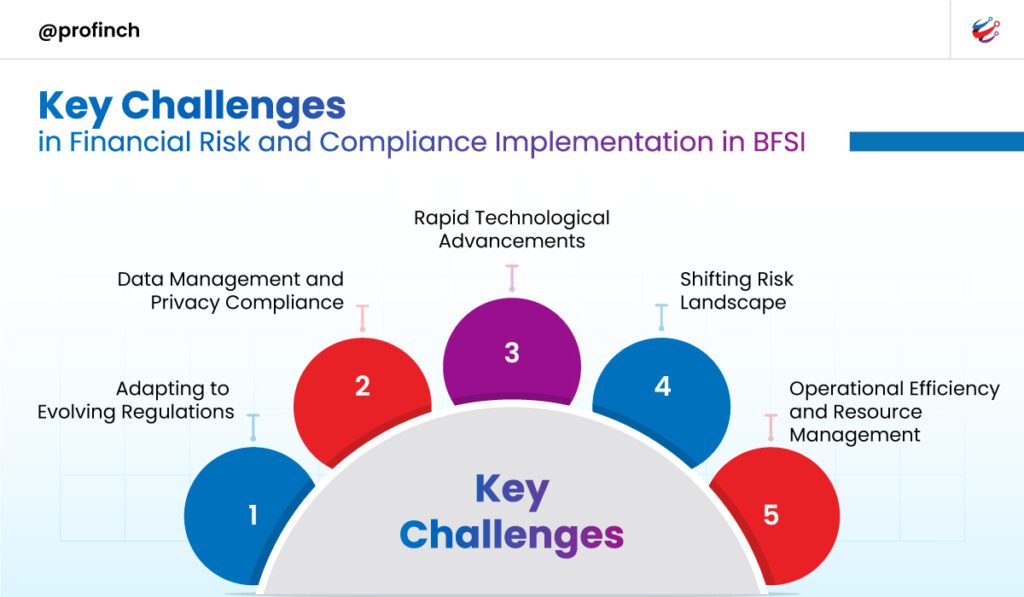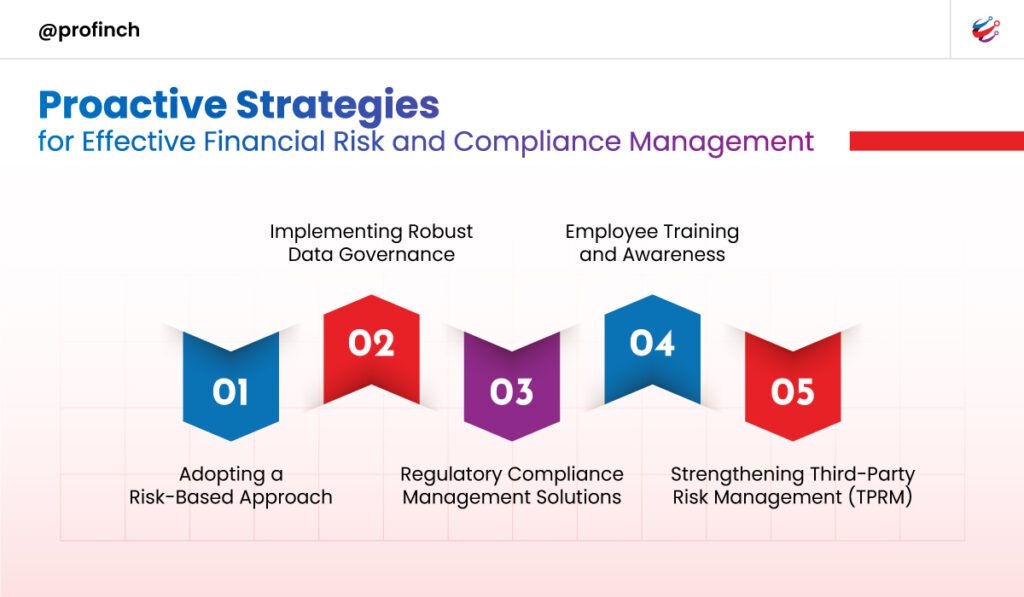Key Challenges and Strategic Recommendations for Implementing Financial Risk and Compliance Solutions in BFSI
Table of content
- Introduction
- Key Challenges in Financial Risk and Compliance Implementation in BFSI
- Adapting to Evolving Regulations
- Data Management and Privacy Compliance
- Rapid Technological Advancements
- Shifting Risk Landscape
- Operational Efficiency and Resource Management
- Proactive Strategies for Effective Financial Risk and Compliance Management
- Adopting a Risk-Based Approach
- Implementing Robust Data Governance
- Regulatory Compliance Management Solutions
- Employee Training and Awareness
- Strengthening Third-Party Risk Management (TPRM)
- Profinch Solutions: Enhancing Compliance and Risk Management
- Conclusion
Introduction
Banks, financial institutions, and insurance companies are constantly adapting to evolving regulations, advancing technology, and rising security threats in today’s complex financial landscape. Effectively implementing financial risk and compliance solutions is paramount for BFSIs to protect their clients, maintain a strong reputation, and ensure financial resilience.
This blog will explore the significant challenges encountered in implementing risk and compliance frameworks and offer actionable strategies to navigate these complexities.
Key Challenges in Financial Risk and Compliance Implementation in BFSI

- Adapting to Evolving Regulations
The financial industry faces continuous regulatory changes, requiring institutions to stay updated with new rules and guidelines. Compliance with Anti-Money Laundering (AML), Know Your Customer (KYC), data privacy, and consumer protection regulations is crucial for avoiding penalties, maintaining public trust, and safeguarding client data.
Country specific regulatory updates reflect the global trend toward stringent governance, pushing financial institutions to adapt and enhance their compliance practices.
For instance, the Anti-Money Laundering and Combating of Terrorism Financing Laws (Amendment) Act, 2023, (in Kenya) strengthened the compliance framework by increasing penalties, enhancing disclosure requirements, and mandating specific obligations for private companies.
Taking action and adapting to these frequent changes, on time, seamlessly, often becomes a painstaking challenge without a strategic partner to glide through the tide.
- Data Management and Privacy Compliance
Data is a powerful asset, yet managing it securely, and then using it optimally, is a major challenge for financial institutions. With massive volumes of sensitive customer data, organizations must adhere to stringent data privacy laws like the General Data Protection Regulation (GDPR) and California Consumer Privacy Act (CCPA) and other laws as applicable, to avoid breaches and potential fines.
In the UAE, the Federal Decree Law No. 45/2021 on Personal Data Protection established clear data protection standards, including cross-border data flow provisions. Meanwhile, Saudi Arabia’s Personal Data Protection Law (PDPL) introduced hefty penalties for non-compliance. These laws underline the importance of strong data governance, especially as financial institutions face increased scrutiny on data privacy.
- Rapid Technological Advancements
As financial institutions adopt advanced technologies such as artificial intelligence, robotic process automation, and cloud solutions, they encounter both opportunities and challenges. Although these innovations enhance operational efficiency, they also introduce new risks, particularly regarding data security and system interoperability. For example, adopting a “Bring Your Own Device” (BYOD) policy can expose institutions to data breaches if adequate security protocols aren’t in place.
- Shifting Risk Landscape
Market fluctuations, political instability, and climate change create emerging risks that financial institutions must anticipate. Institutions must be agile to respond to these dynamic threats effectively, which requires flexible risk assessment frameworks and a forward-looking approach to financial risk management.
- Operational Efficiency and Resource Management
Manual workflows, siloed data, and older systems can hinder efficiency and increase costs. Implementing automated and integrated solutions is essential to streamline operations, reduce redundancy, and minimize operational expenses.
Proactive Strategies for Effective Financial Risk and Compliance Management

To overcome these challenges, financial institutions should consider a proactive, strategic approach, prioritizing the integration of risk management and compliance functions with their operational objectives.
- Adopting a Risk-Based Approach
A risk-based approach enables financial institutions to prioritize risks based on their severity. This approach involves assessing both internal (operational and reputational) and external (market and regulatory) factors to allocate resources more effectively and enhance risk mitigation. - Implementing Robust Data Governance
Strong data governance frameworks are essential for safeguarding customer information and maintaining compliance with privacy regulations. Institutions should define clear data classification standards, enforce strict access controls, and implement data retention policies to protect sensitive information and maintain data integrity. - Regulatory Compliance Management Solutions
Keeping up with changing regulations requires institutions to establish comprehensive compliance programs that include regular assessments, audit controls, and mitigation strategies. Profinch offers Core Banking Solutions and other compliance solutions that streamline these processes, enabling institutions to manage regulatory requirements efficiently. Employee Training and Awareness
Empowering employees with training tailored to their roles and responsibilities is crucial. Effective compliance training includes interactive elements that enhance understanding and engagement, ensuring that employees are prepared to uphold compliance standards across all operational areas.Profinch also offers System Integration Services, connecting you with the right talent. With a dedicated team of technology specialists, we ensure clients have the expert resources to achieve their business objectives seamlessly and efficiently.
Profinch’s System Integration Services, becomes a better alternative to hiring full time employees, as you don’t have to search for top candidates having the required skillsets, No time-loss due to interview->Selection->Joining->Training and so on so forth. With Profinch’s SI services, you straight up hire the right candidate who can start working on your requirements from day 1.
- Strengthening Third-Party Risk Management (TPRM)
As financial institutions increasingly rely on third-party vendors, it’s essential to assess and mitigate the risks associated with these partnerships. TPRM involves evaluating vendor reliability, setting clear standards, and implementing continuous monitoring processes to protect the institution’s operational integrity.
Profinch Solutions: Enhancing Compliance and Risk Management
Profinch specializes in developing robust risk and compliance solutions tailored to the needs of banks, financial institutions, and insurance companies. With a team of seasoned industry experts, we offer a suite of solutions that ensure your organization can navigate regulatory challenges and enhance operational efficiency:
- Core Banking Transformation: Profinch’s core banking implementation and modernization solutions empower financial institutions to modernize their operations, ensuring compliance with local and global regulations while optimizing workflows.
- Data Privacy and Governance: We provide data governance frameworks that help organizations safeguard sensitive data, maintain compliance with data privacy laws, and streamline data management processes.
- Third-Party Risk Management: Our TPRM solutions allow institutions to assess and manage risks associated with third-party vendors, ensuring secure partnerships.
- Regulatory Compliance Solutions: Profinch’s regulatory compliance solutions offer comprehensive tools to manage evolving regulations, conduct assessments, and perform audits, enabling institutions to stay ahead of compliance demands.
- Digital Transformation Solutions: Our omni-channel, customer-centric digital banking solutions that adapt as bank/Financial institution grow and expand operations.
- Managed Services: Profinch’s Managed Services offers comprehensive day-to-day support and optimization, helping banks maintain performance, compliance and faster rollout for sustained customer experience.
- System Integration Services: Avail out SI Services for highly skilled talent for specialized roles on a project-to-project basis or otherwise, and avoid long recruitment, training, and onboarding complexities. Save time, cost and liability.
- Global Transaction Banking (GTB): Tailors transaction banking solutions that cater to corporate and other banking needs.
- Testing Services: Our Testing Services delivers comprehensive testing to guarantee functionality, compliance, and reliability of banking systems.
- Infrastructure Services: The only banking-specific infrastructure solutions, that is cost-effective, scalable, providing long-term value and peace of mind.
Conclusion
In an environment marked by stringent regulations, rapid technological advancements, and emerging risks, financial institutions must adopt robust strategies to manage risk and compliance effectively. By leveraging best practices and specialized solutions from Profinch, banks and financial institutions can protect their reputation, enhance operational efficiency, and ensure compliance with evolving regulatory standards.
Whether navigating evolving regulations or managing data privacy concerns, Profinch’s financial risk and compliance solutions offer the expertise and tools needed to thrive in today’s rapidly evolving financial landscape and customer expectations.
